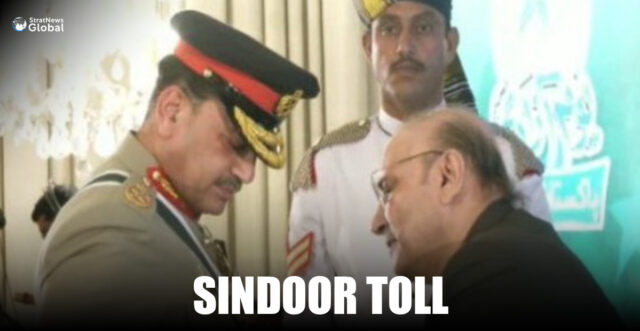A supposedly triumphant list of gallantry awardees published by Pakistan’s Samaa TV on August 14 has instead turned into a grim reminder of India’s devastating retaliation for the Pahalgam massacre. The channel revealed the names of 138 Pakistani Army personnel honoured posthumously—all suffixed with the title “Shaheed”—before hurriedly scrubbing the list from its website.
The awards were announced by President Asif Ali Zardari “for outstanding courage, gallantry, and supreme sacrifice during Operation Bunyanun Marsoos.” But the roll call of the dead underlined the scale of losses suffered by Pakistan’s military machine in India’s Operation Sindoor, launched in the aftermath of the April 22 Pahalgam killings, where terrorists called out and butchered 24 Hindu tourists as well as a Christian tourist and a local Muslim.
According to the Samaa list, 4 personnel were awarded the Tamgha-e-Jurat, 1 the Sitara-e-Basalat, 4 the Tamgha-e-Basalat, and 129 received the Imtiazi Sanad—all posthumously. What was meant as a solemn recognition of sacrifice instead inadvertently confirmed what Islamabad has tried to hide: the Pakistan Army paid a heavy price for shielding and nurturing terror proxies.
The awards were part of Pakistan’s Independence Day honours on Thursday, where dozens of military and civilian officials received accolades for their roles in the four-day conflict with India. Among others, Air Chief Zaheer Ahmad Babar Sidhu received the Hilal-e-Jurat, Naval Chief Admiral Naveed Ashraf the Nishan-e-Imtiaz, and several fighter pilots the Sitara-e-Jurat. Civilian leaders, including Deputy PM Ishaq Dar, Defence Minister Khawaja Asif, and former Foreign Minister Bilawal Bhutto Zardari, were also honoured.
Operation Sindoor, conducted on the night of May 6 and 7, had already delivered a crippling blow to Pakistan’s terror ecosystem. Precision strikes by Indian forces eliminated around a dozen high-value jihadi commanders, including:
- Yusuf Azhar, IC-814 hijacker and brother-in-law of Maulana Masood Azhar, killed at Jaish’s Bahawalpur headquarters.
- Abu Jundal alias Mudassar, head of Lashkar-e-Taiba’s Muridke HQ, who received a guard of honour at his funeral, attended by Pakistani generals and Punjab CM Maryam Nawaz.
- Abu Akasha alias Khalid, Lashkar’s weapons smuggler and attacker in J&K, buried in Faisalabad with senior army officials in attendance.
- Mohammad Hassan Khan, son of JeM commander Mufti Asghar Kashmiri, who coordinated the 2016 Nagrota attack.
Indian intelligence confirmed funerals of these so-called “martyrs” were attended not only by Pakistan’s political leadership but also senior military brass, exposing once again the thin veil between Rawalpindi’s barracks and its terror affiliates.
Between the jihadi elite neutralised in May and the 138 Pakistani soldiers now confirmed dead, Operation Sindoor has left Pakistan’s military-political nexus bloodied and humiliated. What Islamabad hails as “martyrdom” is, in reality, the toll of India’s most audacious cross-border retaliation in decades—a campaign that has struck at the very heart of Pakistan’s terror state.
The hurried removal of Samaa TV’s report underlines the deep embarrassment within Pakistan: in trying to glorify its dead, it inadvertently confirmed the scale of India’s strike and the losses inflicted on its armed forces.
But that didn’t stop Pakistan Army Chief Field Marshal Asim Munir awarding himself the Hilal-e-Jurat, the country’s second-highest wartime gallantry medal, at the August 14 ceremony. Netizens erupted in derision, dubbing it the “ultimate flex,” mocking the gesture as a hollow attempt to validate a failed campaign.
Munir’s self-promotion to Field Marshal in the aftermath of Operation Sindoor had already raised eyebrows— and some analysts see it as a strategic move to shield him from accountability in the wake of military setbacks.
In a career spanning three decades and counting, Ramananda (Ram to his friends) has been the foreign editor of The Telegraph, Outlook Magazine and the New Indian Express. He helped set up rediff.com’s editorial operations in San Jose and New York, helmed sify.com, and was the founder editor of India.com.
His work has featured in national and international publications like the Al Jazeera Centre for Studies, Global Times and Ashahi Shimbun. But his one constant over all these years, he says, has been the attempt to understand rising India’s place in the world.
He can rustle up a mean salad, his oil-less pepper chicken is to die for, and all it takes is some beer and rhythm and blues to rock his soul.
Talk to him about foreign and strategic affairs, media, South Asia, China, and of course India.





